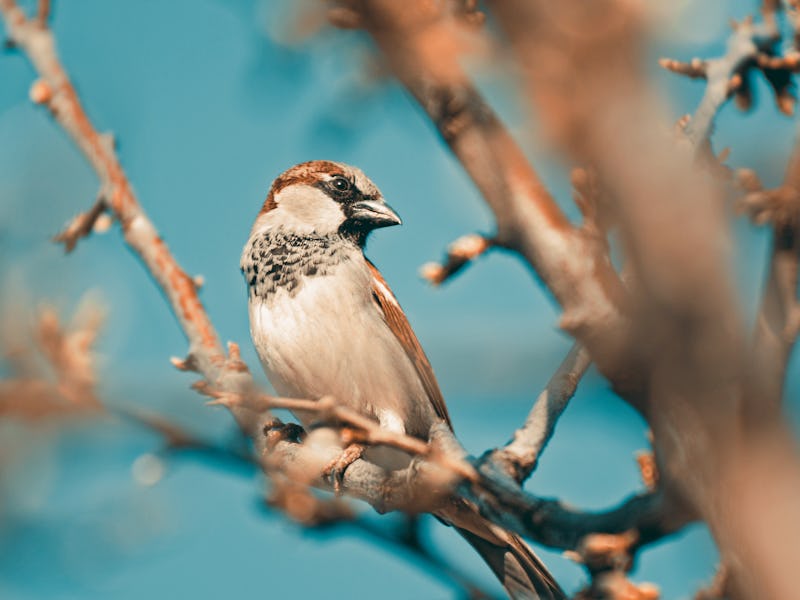Common Insecticide Linked to Worrying Effects in Migrating Songbirds
They ate less and took longer to recover.

If you’ve ever been on a long car trip, you know that stopping for gas and snacks is essential for keeping up morale and propelling your car and its passengers to their destination. The same is true for migrating songbirds. Some birds can fly thousands of miles without stopping, but when it finally comes time for a pit stop, refueling is essential. But new research published Thursday in Science shows evidence that a common type of insecticide might be making it harder for these birds to keep going.
The insecticides in question, called neonicotinoids, make up a class of agricultural pesticides commonly used around the world to keep insects from destroying food crops. Farmers use them to treat a wide range of crops, including maize, fruits, soy, and vegetables, but study co-author and University of Saskatchewan ecotoxicologist Christy Morrissey, Ph.D., told Inverse that treating seeds and soil accounts for about 60 percent of this pesticide’s use worldwide. And it’s these treated seeds, Morrisey and her team observed, that may be resulting in significant weight loss in songbirds and a delay in their migratory patterns.
“Birds are known to eat treated seeds left on the soil surface or at seed spills,” Morrissey said in an email. “If a small songbird eats just a few of these treated seeds, our research shows it causes anorexic effects such as appetite suppression and rapid weight loss. It reduces the birds’ fat load and this in turn had an impact on when the birds departed the stopover site to continue their migration.”
A white-crowned sparrow.
In their, study the authors looked specifically at the effects of a neonicotinoid called imidacloprid on wild white-crowned sparrows. Using controlled dosing and lightweight trackers, the researchers were able to observe how high, low, or zero doses of the insecticide affected the birds as they traveled from their homes. To make their results relevant to real-world applications, even the highest doses used in the study are still on par with what a bird might naturally consume in the wild.
Over a six-hour observation period, the researchers observed a significant loss in body mass in the birds with both high and low doses of imidacloprid, while the control birds who received none saw no significant loss. The researchers can’t say conclusively what caused this loss in mass for the birds, but they did observe that high-dose birds consumed on average of 70 percent less food during the observation period than the control birds, which could indicate that the insecticide is suppressing their appetites.
Beyond this effect, it looked like the birds that ate imidacloprid also took longer to recover from each leg of their flights. After the initial dosing and observation, the study authors saw from the birds’ trackers that the dosed birds had longer stopovers during subsequent migration flights than the control birds: a median of four days for high-dosed birds versus the non-dosed birds’ half-day stopovers.
From this observation the researchers hypothesize that the dosed birds may be taking longer to refuel their depleted fat and energy stores before setting off again, potentially putting the success of their genetic line at risk in the process.
Migratory birds who eat neonicotinoid-treated seeds seem to experience issues during migration.
“If birds lose fat during the stopover, a time when they should be rapidly gaining, this affects their decision to depart and will slow their migration pace,” said Morrissey. “That can have a negative effect on the birds’ chance[s] of survival and breeding success.”
However, when the dosed birds did eventually set off again the researchers observed no irregularity in their flight paths, suggesting that they had sufficiently recovered from the toxic effects of the insecticide and that its toxicity was not permanent.
Yet, because these wild migratory birds are likely to encounter the same or similar insecticides again and again during different legs of their migratory paths, the temporary recovery would probably be short lived under typical conditions. This recurring intoxication could have repercussions for not just the birds, but for the ecosystems they contribute to across the nation.
Abstract: Neonicotinoids are neurotoxic insecticides widely used as seed treatments, but little is known of their effects on migrating birds that forage in agricultural areas. We tracked the migratory movements of imidacloprid-exposed songbirds at a landscape scale using a combination of experimental dosing and automated radio telemetry. Ingestion of field-realistic quantities of imidacloprid (1.2 or 3.9 milligrams per kilogram body mass) by white-crowned sparrows (Zonotrichia leucophrys) during migratory stopover caused a rapid reduction in food consumption, mass, and fat and significantly affected their probability of departure. Birds in the high-dose treatment stayed a median of 3.5 days longer at the site of capture after exposure as compared with controls, likely to regain fuel stores or recover from intoxication. Migration delays can carry over to affect survival and reproduction; thus, these results confirm a link between sublethal pesticide exposure and adverse outcomes for migratory bird populations.